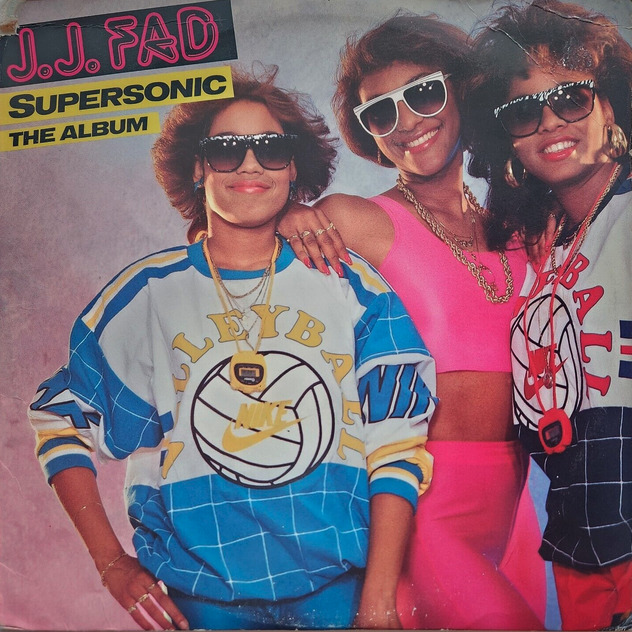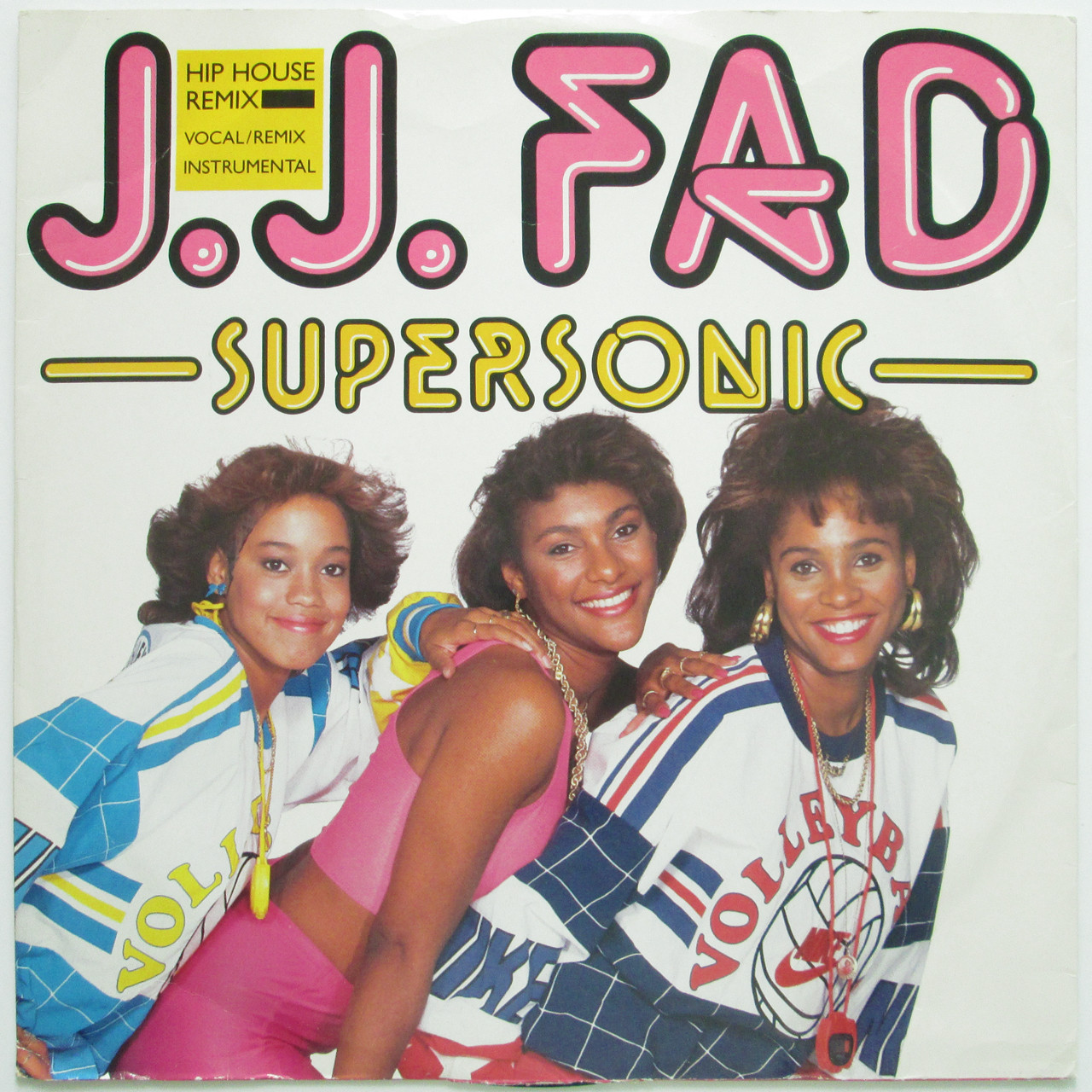The History and Impact of "Supersonic" by J.J. Fad
The first time I heard "Supersonic" by J.J. Fad, it was like lightning struck the dancefloor. Being a devoted follower of electro-funk and Miami bass, I was immediately captivated by Arabian Prince's masterful production that perfectly blended those rapid-fire drum machine beats with those irresistible synthesizer lines.
When the track dropped in the club that night in '88, the energy was electric - everyone lost their minds to that perfect fusion of electro and hip-hop. I had to get my hands on the 12-inch single right away, and when the full album dropped on June 15th that same year, it was an instant cop. While J.J. Fad's momentum unfortunately cooled after their groundbreaking Grammy nomination - they were the first female rap group to achieve that honor - their impact on hip-hop history is undeniable.
Today, it's time to dive deep into the story behind this revolutionary track that brought together the genius of Arabian Prince, Dr. Dre, and DJ Yella to create one of the most influential songs of the late 1980s.
The Creation of J.J. Fad
J.J. Fad, an acronym that originally stood for the first names of its members (Juana, Juanita, Fatima, Anna, and Dania), was formed in 1985 in Rialto, California. The group initially started as a quintet but eventually evolved into a trio consisting of Juana Burns (MC J.B.), Dania Birks (Baby D), and Michelle Franklin (Sassy C). They were among the first acts signed to Eazy-E's Ruthless Records, a label that would later become synonymous with West Coast hip-hop.
The name J.J. Fad later took on a new meaning: "Just Jammin', Fresh and Def," reflecting the group's vibrant and confident persona. Backed by DJ Train (Clarence Lars), the group quickly gained attention for their unique style and high-energy performances.

The Birth of "Supersonic"
"Supersonic" was first recorded in 1987 by the original lineup of J.J. Fad. It was released as the B-side to the single "Anotha Ho" on Dream Team Records. However, the song gained little traction at the time. In 1988, the restructured trio re-recorded "Supersonic," which became the title track of their debut album. The new version was produced by Arabian Prince, a member of N.W.A., and released under Ruthless Records.
The song's production was heavily influenced by electro-funk and Miami bass, featuring rapid-fire lyrics, drum machines, and synthesizers. This innovative sound set "Supersonic" apart from other rap tracks of the time, which were generally slower and more laid-back. The song's fast-paced delivery and infectious beat made it an instant hit.
Supersonic Lyrics (click to expand)
We're J.J. Fad and we're here to rock
Rhymes like ours could never be stopped
See, there's three of us and I know we're fresh
Party rockers, non-stoppers, and our names are def
See, the "J" is for "just"
The other for "jammin"
The "F" is for "fresh"
"A" and "D" "def"
Behind the turntables is DJ Train
Mixin' and scratchin' is the name of the game
Now here's a little somethin' 'bout nosey people
It's not real hard, it's plain and simple
Baby-DSupersonic
SupersonicSupersonic motivating rhymes are creating
And everybody knows that J.J. Fad is devastating
We know you like us girls so you better get stirl'
'Cause we are the home chicks that are rockin' your worldSupersonic
SupersonicSupersonic is a word when people start to listen
Especially bigger people, they pay close attention
You might not believe it, you might not even buy it
But when it comes to our lady (beatbox)
You might even try itSupersonic
SupersonicNow all you supersonic people try to bite our rhymes
You may think that you are def, but you're way behind
S-s-so, you better listen good to what we have to say
'Cause when it comes to J.J. Fad, you can't get no playSupersonic
SupersonicNow he's the freshest DJ from coast to coast
My man can cut and scratch, but I don't mean to boast
He may be a little light, but that's okay
'Cause when he cuts to the beat, it sounds this way
Hit itSupersonic
SupersonicUh, uh, uh, yeah, it's finally my turn to rock the mic
Because my devastating beats I know you will like
You see my beat box is fresh, it'll blow your mind
And if you don't like my beats, I'll go big in your behind
(Ha-ha-ha-ha-ha-ha-uh-uh-ha)Supersonic
SupersonicNow you party people know what Supersonic means
We didn't try to brag cause J.J. Fad is just too clean
Now baby, don't you know that our rhymes are so bionic
Don't listen too hard, don't be supersonicSupersonic
SupersonicYou see, the "S" is for super
And the "U" is for unique
The "P" is for perfection
And you know that we are freaks
The "E" is for exotic
And the "R" is for raps
So tell those nosey people just to stay the hell backSupersonic
Them big everlasting ears
Supersonic
They can hear what I say faster than I can say it
Supersonic
They better chill
(Rockbox) It's like, it's like
She's supersonic
You ran out of words
Hit it, Baby-DI'm light-skinned, devastatin'
I know one thing that he is hatin'
That's right, 'cause doll, I think
I'll take your man and you made him
Always rappin', always clappin', everybody say I'm happy
If you try to hang with me, you should finally, truly see
I'm always rockin', never stoppin', devastatin' rappin' lady
When I'm on the microphone to see here all these imitators
Figure is the difference is that everybody say I'm different
There's no other angel lover
Everybody know I'm covered
Clientele is a pearl, everybody know in jail
To the beat so you can tell everybody know your cell
A sama lama lama lama doo ma nama seema nama
Lama nama doo ma nama lama nama seema nama
Lama nama doo a nama nama nama seema lama
Lama nama seema nama doo ma nama hama, yeah
Yeah, that was it
That's it (That's it)
Musical Style and Genre:
The song blends elements of hip hop and electro, with a significant influence from Miami bass. This combination results in a danceable track with rapid-fire lyrics and electronic instrumentation. The production, handled by Arabian Prince, Dr. Dre, and DJ Yella, incorporates synthesized basslines and drum machine patterns typical of the electro and Miami bass styles.
Tempo:
"Supersonic" is known for its fast-paced rhythm, aligning with the high-energy beats prevalent in late 1980s hip hop and electro tracks. The brisk tempo complements the group's quick vocal delivery, enhancing the song's dynamic feel.
Influences:
The track draws inspiration from the electro-funk movement of the early 1980s, with artists like Afrika Bambaataa and the Soulsonic Force influencing its sound. Additionally, the Miami bass scene, known for its deep bass and party-oriented themes, plays a role in shaping the song's style. The production techniques of Dr. Dre and DJ Yella also contribute to its distinctive sound, reflecting the West Coast hip hop scene's evolution during that era.
Producers Behind the Track
The production team behind the track reads like a West Coast hip-hop hall of fame. Arabian Prince laid that electro-funk foundation, while Dr. Dre brought the meticulous production style that would later revolutionize the genre. DJ Yella's expertise from his World Class Wreckin' Cru days added layers of sophistication to the beats. Eazy-E was the executive producer. Each producer brought their unique genius to the mix, creating something larger than any single influence.
Dr. Dre (Andre Young):
Dr. Dre, born André Romelle Young, is a seminal figure in the music industry, renowned for his transformative impact as a producer. He co-founded N.W.A., pioneering the gangsta rap subgenre with groundbreaking tracks that brought West Coast hip hop to the forefront.
In 1992, Dre released his solo debut album, The Chronic, introducing the "G-Funk" sound characterized by synthesizer-based rhythms and slow, heavy beats, which became a defining style of 1990s hip hop.
As the founder of Aftermath Entertainment, he played a pivotal role in launching the careers of Eminem and 50 Cent, producing their early albums and contributing to their global success.
- Background: A founding member of N.W.A and a pivotal figure in West Coast hip hop.
- Production Style: Known for his innovative production techniques, blending funk samples with drum machine beats, which later evolved into the G-funk sound.
- Notable Works: Beyond "Supersonic," Dr. Dre produced N.W.A's "Straight Outta Compton" and his solo album "The Chronic."
DJ Yella (Antoine Carraby):
- Background: Also a member of N.W.A, DJ Yella started his career as a DJ and producer with the World Class Wreckin' Cru.
- Production Style: Collaborated closely with Dr. Dre, contributing to the early West Coast hip hop sound characterized by heavy beats and explicit lyrics.
- Notable Works: Co-produced N.W.A's albums and worked on Eazy-E's solo projects.
Arabian Prince (Kim Renard Nazel):
- Background: An original member of N.W.A, Arabian Prince is a rapper, singer, songwriter, and producer.
- Production Style: Influenced by electro-funk, he integrated electronic sounds and drum machines into his productions.
- Notable Works: Produced early tracks for N.W.A and released solo albums like "Brother Arab."
Eazy-E (Eric Wright):
Eazy-E's visionary leadership at Ruthless Records gave "Supersonic" the platform it deserved.
- Background: Founder of Ruthless Records and a member of N.W.A, Eazy-E was instrumental in bringing West Coast hip hop to prominence.
- Role in "Supersonic": Served as the executive producer, overseeing the project's development and release.
- Notable Works: Released solo tracks like "Boyz-n-the-Hood" and was a key figure in N.W.A's success.
The Success Story
When April 18, 1988 arrived, the track exploded onto the scene. The numbers tell the story - number 30 on the Billboard Hot 100, number 10 on the Dance/Club Play charts, dominating dance floors for eight straight weeks. That RIAA gold certification represented more than 500,000 units moved, but the real impact happened in clubs and on streets across America.
The album "Supersonic," released on June 15, 1988, also achieved significant success. It was certified gold by the RIAA on September 30, 1988, and featured other tracks like "Way Out" and "Is It Love." The album's success cemented J.J. Fad's place in music history as the first female rap group to be nominated for a Grammy Award.

Trivia and Fun Facts
First Grammy Nomination for a Female Rap Group
J.J. Fad made history as the first female rap group to receive a Grammy nomination, setting a precedent for future artists. "Supersonic" was nominated for Best Rap Performance at the 1989 Grammy Awards, a groundbreaking achievement for women in hip-hop.
Cultural References
"Supersonic" has been referenced in songs by Eminem, Run the Jewels, and Fergie, showcasing its lasting influence on the music industry.
VH1 Recognition
The song was ranked number 76 on VH1's list of the "100 Greatest One-Hit Wonders of the '80s".
Production Dispute
The song has been influential and has been referenced or sampled in various tracks over the years. For instance, Fergie's 2006 hit "Fergalicious" incorporates elements reminiscent of "Supersonic," including parts of the beat and lyrical delivery. In 2009 Arabian Prince, the producer of "Supersonic," was involved in a legal dispute over royalties from the song's sampling in later years. Arabian Prince filed a lawsuit against Ruthless Records over unpaid royalties related to the use of "Supersonic" in "Fergalicious". The case was settled out of court.

Despite their success, J.J. Fad faced numerous challenges as an all-female rap group. The music industry in the 1980s was heavily dominated by men, and female artists often had to fight against gender biases and stereotypes. J.J. Fad's perseverance and talent allowed them to overcome these obstacles and pave the way for future generations of female rappers (Musician Wages).
However, the group struggled to replicate the success of "Supersonic" with subsequent releases. Their sophomore album, "Not Just a Fad," released in 1991, failed to achieve the same level of commercial success, leading to the group's disbandment in 1992. Despite this, their impact on the music industry remains undeniable.

"Supersonic" by J.J. Fad is a cultural milestone that revolutionized hip-hop and pop music. It is widely regarded as one of the most influential rap songs of the 1980s. It showcased the immense talent of J.J. Fad and broke down barriers for female artists in a male-dominated industry. The song's rapid-fire delivery and catchy hooks inspired a generation of rappers to experiment with faster tempos and more complex rhyme schemes.
The song also had a lasting impact on pop culture. It has been sampled and referenced in numerous songs over the years. Eminem, for example, paid homage to J.J. Fad in his song "Rap God," where he references "Supersonic" before launching into a rapid-fire verse.The song's innovative production, rapid-fire lyrics, and trailblazing success paved the way for female artists in a male-dominated industry. Despite the challenges they faced, J.J. Fad's legacy endures, inspiring new generations of musicians and fans alike. Their story is a testament to the power of perseverance, talent, and innovation in shaping the music industry.



